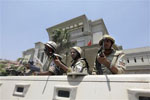 Wall Street Journal: The fall of Egypt’s President Mohammed Morsi presents Iran with a new challenge: Establishing a relationship with an as-yet-undefined leadership while distancing itself from past efforts to court the Muslim Brotherhood. The Wall Street Journal
Wall Street Journal: The fall of Egypt’s President Mohammed Morsi presents Iran with a new challenge: Establishing a relationship with an as-yet-undefined leadership while distancing itself from past efforts to court the Muslim Brotherhood. The Wall Street Journal
By FARNAZ FASSIHI
 BEIRUT—The fall of Egypt’s President Mohammed Morsi presents Iran with a new challenge: Establishing a relationship with an as-yet-undefined leadership while distancing itself from past efforts to court the Muslim Brotherhood.
BEIRUT—The fall of Egypt’s President Mohammed Morsi presents Iran with a new challenge: Establishing a relationship with an as-yet-undefined leadership while distancing itself from past efforts to court the Muslim Brotherhood.
Iran’s high-level officials and state media haven’t commented on the protests and military coup that drove Mr. Morsi and his Islamist party from power over the past week. But on Friday, the regime began to characterize the events in Egypt through the prism of Iran’s resistance against Israel, the West and the Salafists, the Sunni movement that gained political clout alongside Egypt’s Brotherhood.
A chorus of Friday prayer sermons across Iran by representatives of Supreme Leader Ayatollah Ali Khamenei slammed Mr. Morsi and the Brotherhood for choosing not to sever ties with Israel, honoring Egypt’s peace accord with the Jewish state, and maintaining relations with the U.S.
The sermons unanimously said that the people of Egypt had risen up against Mr. Morsi because he had failed to be independent from the West and form an alliance with the “axis of resistance”—Iran, Hezbollah and Syria.
“Instead of leading the Muslim world to unite, they [Muslim Brotherhood] sided with murderers. They promoted fear of Iran and Shiites,” said Ayatollah Ahmad Khatami, delivering Tehran’s Friday sermon.
Mr. Khatami’s comment was among those about Egypt posted online Friday by Fars News Agency, affiliated with the Revolutionary Guard Corps.
In Mashhad, a holy Shiite city in northeast Iran, the cleric leading Friday prayers said Egyptians had trusted the Muslim Brotherhood because it was an Islamic party but “the Muslim Brotherhood did wrong and derailed from its principles.”
When the Arab Spring swept across the Middle East in 2011, Iran declared that the pro-democracy uprisings were inspired by its own 1979 revolution, which ended thousands of years of monarchy.
Egypt’s overthrow of President Hosni Mubarak drew the most direct comparisons. Both revolutions put power in the hands of long-suppressed Islamist parties with grass roots support. Both nations toppled secular autocrat rulers with close ties to the West and strong armies. The climax of Egypt’s revolution even fell on the anniversary of Iran’s, February 11, 2012.
Iran initiated an aggressive diplomatic campaign to restore relations with Egypt, which were cut off after Egypt sheltered the deposed Shah of Iran in 1979.
President Mahmoud Ahmadinejad and Mr. Morsi each visited the other’s country, the first Iranian and Egyptian presidents to do so in more than three decades.
Still, sharp divisions strained relations—mostly over the conflict in Syria and the sectarian Sunni-Shiite rivalries in the region.
But Iran’s efforts paid off, to some degree. Travel between the two countries was permitted for citizens. Official delegations from both sides shuttled between Cairo and Tehran to discuss politics, business opportunities and tourism.
In May, a group of 45 Egyptian officials toured Iran’s historic sites for five days at the invitation of Iran, according to Iranian newspapers, which quoted an Egyptian official saying it was “time for Egypt to move forward its ties with Iran.”
Iran, with a new president, Hasan Rouhani, slated to take office next month, will have to recalibrate its approach to the interim rulers of Egypt or its next government.
But the message from Iran’s ruling clerics on the chaos in Egypt is already sinking in with many constituents.
“These events show that Western-style democracy doesn’t work in the Middle East,” wrote Reza, an Iranian man, in the commentary section of the website Iran Diplomacy, affiliated with the country’s foreign ministry. “Thank God we have stability here.”


